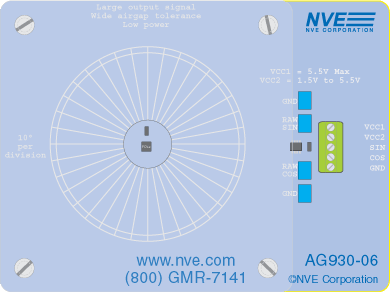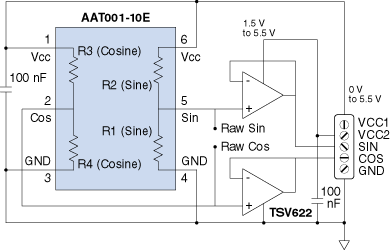|
| “ |
...the first of its type produced in the world.”
|
” |
| |
NVE angle sensors were featured in two-page article in a recent issue of the German trade journal
Industrielle Automation.
The article is titled “So misst man Winkel heute” (“How One Measures Angle Today”).
Download Article >
|
|
|
 |
Voicemail Playlist |
 |
|
 Keeping with this month’s angle sensor theme, The Byrds’ classic “Turn Turn Turn” is our current phone system background music.
Keeping with this month’s angle sensor theme, The Byrds’ classic “Turn Turn Turn” is our current phone system background music. |
|
|
 |
|
|
 |
|
|
 Angle Sensor Evaluation Kit Angle Sensor Evaluation Kit |
|
|
Ultraprecise angle sensing is demonstrated with the new Angle Sensor Evaluation Kit. The kit includes an evaluation circuit board with an AAT001-10E Angle Sensor and a unity-gain buffer amplifier (see the reference design below).
A split-pole magnet and a plastic magnet locating fixture are included in the kit. An angular reticle on the circuit board aids in characterizing output versus angle.
Two sinusoidal outputs 90 degrees out of phase provide quadrature direction information. The circuit board can be powered with a 1.5 V to 5.5 V power supply.

Angle Sensor Evaluation Kit
AAT001 Angle Sensors use extremely high output spintronic Tunneling Magnetoresistors, with a maximum angular measurement error of a remarkable 0.5 degrees in a fixed-bias magnet configuration.
Other AAT001 features include:
• Unamplified output of at least 130 mV per power supply volt
• Functional airgap range of 2-3 millimeters
• Microwatt power consumption for battery applications
Download Kit Manual >

|
 |
|
|
Upcoming Exhibition |
|
|
New NVE CAN transceivers and other IsoLoop isolated bus transceivers will be featured by Hy-Line Power Components at Vienna Tec, October 9 to 12 at Messe Wien in Vienna, Austria.
|
 |
|
|
Reference Design |
|
|
Buffered Angle Sensing
The high impedance of the AAT001 Angle Sensor (typically 1.25 megohms per resistor) means extremely low power consumption and make them ideal for battery-powered applications.
The sensors can be directly connected to high-impedance analog front ends or other circuitry, and buffer circuitry can be added if necessary for lower impedance circuitry:
 AAT001 Buffer Reference Circuit
AAT001 Buffer Reference Circuit
The op amp minimum supply voltage is 1.5 V, while the AAT001 sensor has no minimum. Sensitivity increases proportionately to the sensor supply voltage, as does current consumption.
“Turn” to this technical video for more information:
Email the Sensor Applications Desk > |
|

